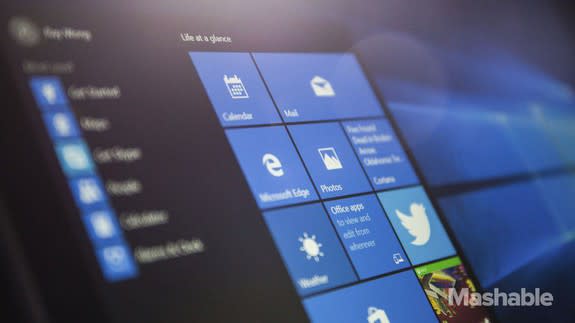Microsoft 'Windows 10 Cloud' could challenge Google's Chrome OS

Microsoft launched Windows 10 with an ambitious goal of getting 1 billion devices to run its operating "service".
Last we checked, Windows 10 is on about 300 million devices. That's not a bad start, but how does the company get to 1 billion? Selling super cheap PCs with a simplified version of Windows 10 to compete directly with Chromebooks running Google's Chrome OS might be the way to go.
SEE ALSO: Interracial couples are finally getting some emoji representation
Earlier this week, ZDNet published a report revealing an unannounced version of Windows 10, referenced as "Windows 10 Cloud," within the latest Windows Insider test builds.
According to the report, Windows 10 Cloud is a "simplified" version of Windows 10 that will only run Universal Windows Platform (UWP) apps downloaded from the Windows Store. Meaning, users with Windows 10 Cloud PCs won't be able to install their own apps from elsewhere.
Following the outing, Italian blog WindowsBlogItalia published the first screenshots of the so-called Windows 10 Cloud:

Image: WindowsBlogitalia
As you can see in the screenshots above and below, Windows 10 Cloud looks identical to the regular version of Windows 10.
The only apparent simplification involves from where apps are installed.
The blog tried to install VLC player (there's a version in the Windows Store that should work, but the one shown above was downloaded from VLC's website), but received an error message saying "This version of Windows was made to help protect you and your device by exclusively running Windows Store apps."

Image: WINDOWSBLOGITALIA
Windows 10 Cloud, however, appears far from ready for prime time. While apps like Slack and Evernote worked fine from the Windows Store, built-in essential apps like Notepad and Paint didn't.
Locking down where you can install apps from feels anti-user, but it's all in the name of security, apparently.
One misleading part of the name "Windows 10 Cloud" is the "cloud" part. Unlike Chrome OS, which relies on cloud-based apps and services, ZDNet says Windows 10 Cloud has "little or nothing to do with the cloud." The name might simply be a way to position it directly against Chromebooks and Chrome OS, indicating to customers that Windows 10 Cloud machines aren't the "full" Windows 10 experience.
But then again, with Chromebooks getting Android apps from the Google Play store this year, Microsoft is no doubt also looking to put its Windows Store front and center on PCs. Windows 10 Cloud would be the perfect way to do just that.

 Yahoo News
Yahoo News 